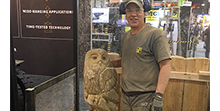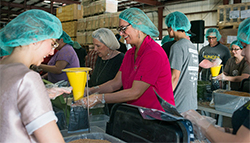Home » Logistics gives back
inbound
Logistics gives back
- Bristol, Conn.-based systems integrator Conveyco Technologies will be the title sponsor of a tournament benefiting the Boys & Girls Club of Bristol. Proceeds from the 2018 Mayor's Cup Golf Outing will help underwrite programming at the club, which provides services for young people from disadvantaged economic, social, and family circumstances.
- Lift truck vendor Hyster Co. auctioned off three wood carvings created by a chainsaw artist at its booth at the Modex show in April. The event raised $1,000 for trade show sponsor MHI's Material Handling Education Foundation, a charitable organization that promotes the study of material handling, logistics, and supply chain management through financial support for students and educators.
- The More Than the Move Foundation, the charitable arm of Houston-based third-party logistics service provider Gulf Winds International, helped to supply 100,712 meals to the Houston Food Bank to continue its relief efforts for families affected by Hurricane Harvey. The foundation partnered with over 25 logistics industry companies to package the meals.
- Oconomowoc, Wis.-based plastic pallet and container manufacturer Orbis Corp. has partnered with Blessings in a BackPack, a nonprofit that seeks to provide food on the weekends for schoolchildren who might otherwise go hungry. Orbis recently partnered with the organization's Waukesha (Wis.) chapter for a "bag fill" project, helping to fill 4,500 grocery bags for children in 13 area schools.
- Newfield, N.J.-based third-party cold chain logistics specialist RLS Logistics has announced a partnership with the Food Bank of South Jersey (FBSJ). To kick off the effort, RLS team members volunteered at the FBSJ's "Stamp Out Hunger" event, where they helped load bags of donated food into mail trucks. The Stamp Out Hunger food drive is conducted annually by the National Association of Letter Carriers to collect food for people in need.
KEYWORDS Conveyco Gulf Winds International Hyster Material Handling Education Foundation Inc. (MHEFI) ORBIS Corp. RLS Logistics
Related Articles
Copyright ©2024. All Rights ReservedDesign, CMS, Hosting & Web Development :: ePublishing

